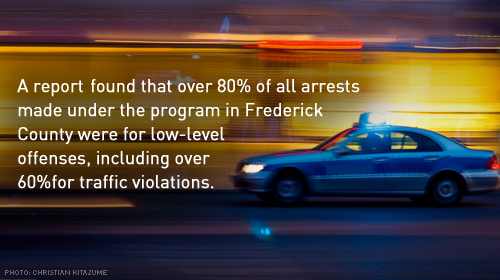A Policy Gone Bad: What Happens When a County Enforces National Immigration Law


A few months ago, the âü¯áû颈§Ý§Ã¿« called on Immigration and Customs Enforcement to end its 287(g) program, which delegates immigration enforcement authority to participating law enforcement agencies across the country. Civil rights and faith organizations joined the âü¯áû颈§Ý§Ã¿« in calling for an end to the program, which has been the subject of severe criticism for promoting racial profiling and harassment of Latinos. The âü¯áû颈§Ý§Ã¿« of Maryland is among the groups that have called for an end to the program in Frederick County, which is the only jurisdiction in Maryland with a 287(g) agreement with ICE.
Frederick County has participated in the 287(g) program since 2008 with virtually unmatched zeal. found that over 80 percent of all arrests made under the program in Frederick County were for low-level offenses, including over 60 percent for traffic violations. The county sheriffãs paint an even starker picture: Of the 995 detainers the office has lodged since it joined the 287(g) program, 902ãover 90 percentãwere for immigrants arrested for misdemeanor offenses. Community advocates and news reports have documented numerous complaints of arbitrary, baseless stops and of racial profiling by the office.
The numbers and the stories strongly suggest that the purpose of the program is not to promote public safety but rather to harass and intimidate immigrants and persons of color. In Frederick County, the most tangible effect the program has had is a 61 percent decrease in the noncitizen Latino and Hispanic population since its enactment, and a marked mistrust of police among the Latino community that remains. There is no evidence the program has led to any gains in law enforcement or in public safety. The recent passage of the Maryland DREAM Act, which voters supported by a wide margin at referendum, indicates that such programs are a thing of the past: Marylanders wish to live in a state that treats all of its residents with equal dignity and respect, and they want no part in racial profiling programs like 287(g).
The problems in Frederick County are a microcosm for the serious problems with 287(g) agreements across the country, including for example in Arizona, Georgia, and North Carolina. Immigrants in 287(g) jurisdictions everywhere have faced the same pattern of racial profiling, abuse, and deterioration of relationships between police and the communities they serve. DHS should recognize that this program has resulted only in civil rights violations and financial waste, and should terminate it, both in Frederick County and elsewhere, once and for all.
Learn more about immigration and customs enforcement: Sign up for breaking news alerts, , and .

